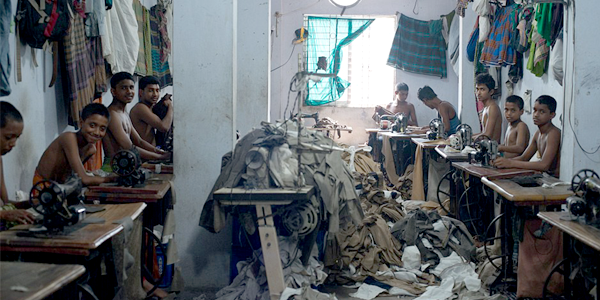Many people believe that it was the government that put an end to child labour in Western Nations but in fact almost all the children in Britain were already in school when child labour was banned. Likewise, child labor laws in the US were passed only after around 90% of the child labor had been eliminated anyway. A large part of the push for these laws came from labour unions who wanted to increase wages by reducing competition from younger workers, and as the business community was not particularly dependent on child labour any more it had no reason to lead a counter charge.
It actually requires an advanced economy to ban children from working. Children had worked throughout all of history, long before the onset of the industrial revolution had them conspicuously running around factories. It was a given fact of life because every pair of hands was needed to provide for a family, so they worked on the farm. As soon as Western economies were rich enough that parents could provide for their children without sending them to work they sent them to school instead. In the mind-nineteenth century before there was any mandatory education in the UK, 95% of children in Great Britain already had at least 5 and often as many as 7 years of education.
Further empirical evidence was recently provided, all to sadly, in Bangladesh where they tried to ban child labour prematurely only to find (as Oxfam reported) that the results were horrific. The kids went into prostitution, destitution, begging, stealing and starvation.

It appears that every society naturally takes children out the workplace when they are rich enough. It's not that parents, all throughout history, hated their children! They sent them to work because there was no viable alternative.
As world poverty continues to decline, things are going in the right direction. Child labour has declined by one third since 2000, from 246 million to 168 million children. It's not that we can do nothing in western nations to speed along this process either, in fact - with the political will - we can. Charity can help, but the primary necessity is to open up free trade with the poorest countries in the world. Removing trade barriers to buying their products would help lift millions out of poverty abroad and lower the cost of living for families on low incomes at home. The next step would be to use our influence to encourage those countries to open up their economies to foreign investment so that companies from all over the world would flood in, bringing technology, skills, and infrastructure while bidding up the price of wages. As adults are able to earn increasingly more they will be able to take their children out of work and into education where they belong.
A. S. 04-03-17
If you liked this article you may also learn from this related article on workplace safety.
It actually requires an advanced economy to ban children from working. Children had worked throughout all of history, long before the onset of the industrial revolution had them conspicuously running around factories. It was a given fact of life because every pair of hands was needed to provide for a family, so they worked on the farm. As soon as Western economies were rich enough that parents could provide for their children without sending them to work they sent them to school instead. In the mind-nineteenth century before there was any mandatory education in the UK, 95% of children in Great Britain already had at least 5 and often as many as 7 years of education.
Further empirical evidence was recently provided, all to sadly, in Bangladesh where they tried to ban child labour prematurely only to find (as Oxfam reported) that the results were horrific. The kids went into prostitution, destitution, begging, stealing and starvation.

As world poverty continues to decline, things are going in the right direction. Child labour has declined by one third since 2000, from 246 million to 168 million children. It's not that we can do nothing in western nations to speed along this process either, in fact - with the political will - we can. Charity can help, but the primary necessity is to open up free trade with the poorest countries in the world. Removing trade barriers to buying their products would help lift millions out of poverty abroad and lower the cost of living for families on low incomes at home. The next step would be to use our influence to encourage those countries to open up their economies to foreign investment so that companies from all over the world would flood in, bringing technology, skills, and infrastructure while bidding up the price of wages. As adults are able to earn increasingly more they will be able to take their children out of work and into education where they belong.
A. S. 04-03-17
If you liked this article you may also learn from this related article on workplace safety.
No comments:
Post a Comment